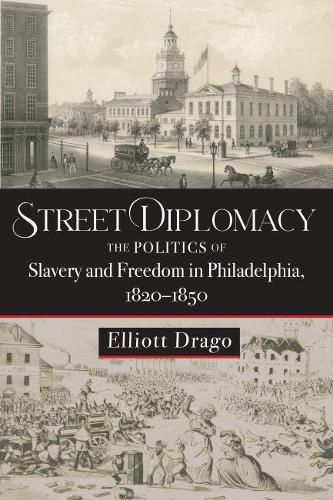Readings Newsletter
Become a Readings Member to make your shopping experience even easier.
Sign in or sign up for free!
You’re not far away from qualifying for FREE standard shipping within Australia
You’ve qualified for FREE standard shipping within Australia
The cart is loading…






An illuminating look at how Philadelphia’s antebellum free Black community defended themselves against kidnappings and how this street diplomacy forced Pennsylvanians to confront the politics of slavery.
As the most southern of northern cities in a state that bordered three slave states, antebellum Philadelphia maintained a long tradition of both abolitionism and fugitive slave activity. Although Philadelphia’s Black community lived in a free city in a free state, they faced constant threats to their personal safety and freedom. Enslavers, kidnappers, and slave catchers prowled the streets of Philadelphia in search of potential victims, violent anti-Black riots erupted in the city, and white politicians legislated to undermine Black freedom. In Street Diplomacy, Elliott Drago illustrates how the political and physical conflicts that arose over fugitive slave removals and the kidnappings of free Black people forced Philadelphians to confront the politics of slavery.
Pennsylvania was legally a free state, at the street level and in the lived experience of its Black citizens, but Pennsylvania was closer to a slave state due to porous borders and the complicity of white officials. Legal contests between slavery and freedom at the local level triggered legislative processes at the state and national level, which underscored the inability of white politicians to resolve the paradoxes of what it meant for a Black American to inhabit a free state within a slave society.
Piecing together fragmentary source material from archives, correspondence, genealogies, and newspapers, Drago examines these conflicts in Philadelphia from 1820 to 1850. Studying these timely struggles over race, politics, enslavement, and freedom in Philadelphia will encourage scholars to reexamine how Black freedom was not secure in Pennsylvania or in the wider United States.
$9.00 standard shipping within Australia
FREE standard shipping within Australia for orders over $100.00
Express & International shipping calculated at checkout
An illuminating look at how Philadelphia’s antebellum free Black community defended themselves against kidnappings and how this street diplomacy forced Pennsylvanians to confront the politics of slavery.
As the most southern of northern cities in a state that bordered three slave states, antebellum Philadelphia maintained a long tradition of both abolitionism and fugitive slave activity. Although Philadelphia’s Black community lived in a free city in a free state, they faced constant threats to their personal safety and freedom. Enslavers, kidnappers, and slave catchers prowled the streets of Philadelphia in search of potential victims, violent anti-Black riots erupted in the city, and white politicians legislated to undermine Black freedom. In Street Diplomacy, Elliott Drago illustrates how the political and physical conflicts that arose over fugitive slave removals and the kidnappings of free Black people forced Philadelphians to confront the politics of slavery.
Pennsylvania was legally a free state, at the street level and in the lived experience of its Black citizens, but Pennsylvania was closer to a slave state due to porous borders and the complicity of white officials. Legal contests between slavery and freedom at the local level triggered legislative processes at the state and national level, which underscored the inability of white politicians to resolve the paradoxes of what it meant for a Black American to inhabit a free state within a slave society.
Piecing together fragmentary source material from archives, correspondence, genealogies, and newspapers, Drago examines these conflicts in Philadelphia from 1820 to 1850. Studying these timely struggles over race, politics, enslavement, and freedom in Philadelphia will encourage scholars to reexamine how Black freedom was not secure in Pennsylvania or in the wider United States.